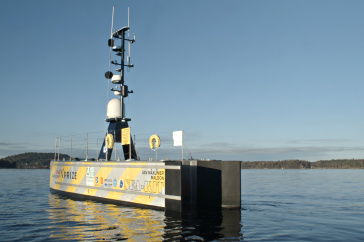The University of New Hampshire inspires innovation and transforms lives in our state, nation and world. More than 16,000 students from all 50 states and 71 countries engage with an award-winning faculty in top-ranked programs in business, engineering, law, health and human services, liberal arts and the sciences across more than 200 programs of study. A Carnegie Classification R1 institution, UNH partners with NASA, NOAA, NSF and NIH, and received $260 million in competitive external funding in FY21 to further explore and define the frontiers of land, sea and space.
UNH Alumni Team Wins $4 Million Grand Prize with Pioneering Technology for Ocean Mapping

The GEBCO-Nippon Foundation Alumni Team designed this uncrewed surface vessel (USV), SEA-KIT MAXLIMER, that pairs with an autonomous underwater vehicle to map the seafloor remotely.
DURHAM, N.H.—A team of alumni from the University of New Hampshire has won the Shell Ocean Discovery XPRIZE, a global competition to advance deep-sea technologies for ocean floor exploration. The GEBCO-Nippon Foundation Alumni Team—alumni and industry partners and advisors based at UNH’s Center for Coastal and Ocean Mapping (CCOM)—prevailed against teams from around the world to win the top prize of $4 million for their concept.
“This challenge asked us to develop better ways of mapping the seafloor,” said team leader Rochelle Wigley, director of UNH’s Nippon Foundation/GEBCO (General Bathymetric Chart of the Oceans) Ocean Bathymetry training program. We and other teams have succeeded. We will now contribute towards mapping our oceans.”
The team’s winning concept demonstrated that high-quality bathymetric data can be obtained inexpensively with little to no human involvement at sea. It utilized the SEA-KIT uncrewed surface vessel (USV) Maxlimer, alongside the Kongsberg Maritime HUGIN autonomous underwater vehicle (AUV) system. Pairing the HUGIN AUV, rated to operate at depths of up to 4,500 meters, with the SEA-KIT USV (designed by the team), which has the ability to autonomously launch and recover the AUV and acts as a communication link during subsea survey operations, made for efficient, safe and cost-effective seafloor mapping.
The system delivers significant potential benefits over traditional mapping missions using multibeam echosounder technology, which typically require large research ships with full scientific crews on board, resulting in costs of tens of thousands of dollars per day. This approach supports the goals of The Nippon Foundation-GEBCO Seabed 2030 project to map the entire seafloor by 2030; currently less than 10 percent of the world’s oceans have been mapped to high resolution.
The team includes 16 alumni of UNH’s Nippon Foundation/GEBCO program: Evgenia Bazhenova (Russia), Aileen Bohan (Ireland), Mohamed Elsaied (Egypt), Andres Fitzcarrald (Peru), UNH data analyst Tomer Ketter (Israel), Christina Lacerda (Brazil), UNH graduate student Jaya Roperez (Philippines), Azmi Rosedee (Malaysia), Ivan Ryzhov (Russia), Hadar Sade (Israel), Sattiabaruth Seeboruth (Mauritius), Masano Sumiyoshi (Japan), Neil Tinmouth (South Africa), Rochelle Anne Wigley (U.S.), Yulia Zarayskaya (Russia) and Karolina Zwolak (Poland).
The team entered the competition in July 2016, successfully making it to the semi-final stage and qualifying for the final round, which saw them travel to Kalamata, Greece, to compete against the other finalists in a 24-hour ocean mapping challenge. This involved producing a five-meter horizontal resolution bathymetric (ocean floor) map as well as high-definition images of biological, archaeological and geological features of the ocean environment, which are critical to understanding the oceans and will help inspire the next generation of educators, students, policymakers and investors to care about ocean discovery, resource development and protection.
The project was based at UNH’s Center for Coastal and Ocean Mapping/Joint Hydrographic Center (CCOM/JHC). The Nippon Foundation/GEBCO (General Bathymetric Chart of the Oceans) Ocean Bathymetry training program brings young scientists from around the world, primarily from developing countries, to UNH to become experts in deep-ocean mapping. Since its inception in 2004, the program has graduated 84 scholars total, the vast majority of whom are working in the marine industry in their home countries.
VIDEO: https://www.youtube.com/watch?v=ogQxUjFRykE&feature=youtu.be
PHOTOS FOR DOWNLOAD
Link: https://www.unh.edu/unhtoday/sites/default/files/media/gebco-nf_alumni_team_in_monoco.jpg
Caption: The GEBCO-Nippon Foundation Alumni Team at the awards ceremony in Monaco where they won top prize of $4 million for their concept.
Link: https://www.unh.edu/unhtoday/sites/default/files/media/sea_kit_maxlimer.jpg
Caption: The GEBCO-Nippon Foundation Alumni Team designed this uncrewed surface vessel (USV), SEA-KIT MAXLIMER, that pairs with an autonomous underwater vehicle to map the seafloor remotely.
Latest News
-
January 12, 2026
-
December 4, 2025
-
November 26, 2025
-
November 6, 2025
-
November 5, 2025













































